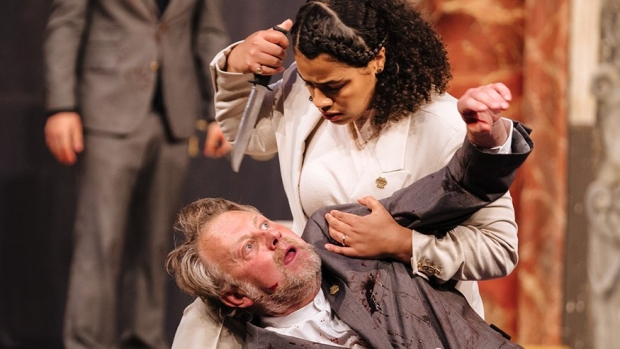Julius Caesar at Shakespeare's Globe – review
Shakespeare’s cautionary tale to warmongering leaders

© Helen Murray
Julius Caesar has some of Shakespeare's most ghoulish and grisly scenes – all of them enacted here with relish. One of the best sees the ghost of Caesar (Dickon Tyrrell) rise to confront his killer, Brutus (Anna Critchlow). You'll be next, warns the slain Roman leader. Anytime you watch this scene, it feels like Shakespeare is cautioning some modern-day politician or other about the perils of overambition, acting without reason, and waging bloody conflicts in which they can only lose.
Directed by Diane Page, this version of Caesar has popped up at an uncertain time for the world (mind you, when was the world last certain?), and it excels at capturing the fear and paranoia such a state triggers in people. The production's strongest scene – arguably the tragedy's most famous – sees Mark Antony (an impassioned Samuel Oatley) persuade a crowd that the dead Caesar was no despot, but a good man. And if carefully-chosen words don't do the trick, Antony learns you might as well show them the dead body. Because nothing turns public opinion quite like graphic imagery.
The show evokes a contemporary conflict – emphasising the propaganda and disinformation that war involves. From the very start, the conspiracists are seen weaving their own version of the truth. "We shall be called purgers, not murderers," says Brutus, planning the PR around the assassination. Charlotte Bate marshals the action nicely, playing chief plotter Cassius – while Jack Myers gets deserved laughs as aloof senator Casca. Things are at their most intriguing as the conspiracy builds.
After the key assassination scene – which is visceral if a bit laboured – civil war quickly kicks off. Events take on a more frantic rhythm that doesn't always give pause for Brutus' psychological torment to unfold. Members of the eight-person cast dash on and off stage, and into battle – rapidly switching characters; sometimes switching sides at the same time, which isn't easy to keep up with.
A decision to turn Brutus and Cassius into female roles makes for a refreshing dynamic. It highlights the fact that women in ancient Rome were denied power, other than some behind-the-scenes influence wielded by those married to important men (it's worth noting that one of Antony's wives, Fulvia, was the first real-life woman to appear on a Roman coin). More saliently, it lets the play again reflect on modern-day politics; querying whether there are enough women in top jobs even now.
Caesar is thought to have debuted in 1599, and was one of the first plays performed at the Globe. It's little wonder that the play obsesses over winning over crowds with smooth PR: Shakespeare must have been concerned with public perception of his new theatre. Page's production shows its own audience some fun – notably when we are prompted to cheer Antony's famous speech as football supporters might. Next, there's a summer tour – including further stints at the Globe.












